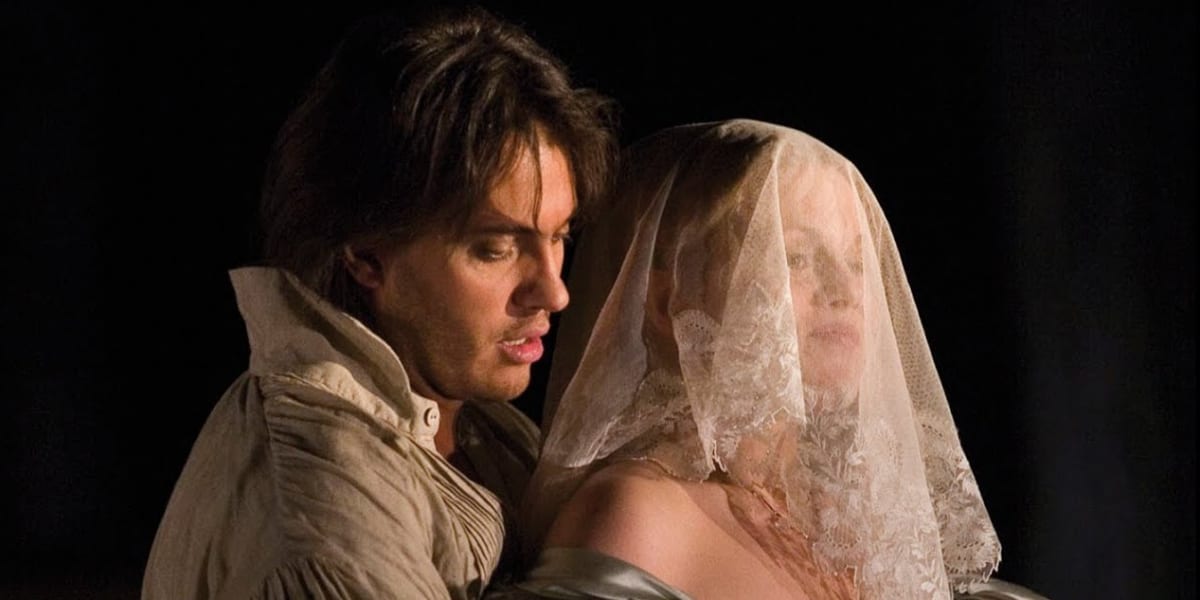Regarded as the first of many successful collaborations between Mozart and librettist Lorenzo Da Ponte, Le Nozze di Figaro is an opera buffa riddled with political satire, convoluted affairs, and an abundance of scandal. Grounded amid the revolutionary attitudes in France of the late 18th century, Pierre de Beaumarchais’ play (1778) serves as the opera’s inspiration. Challenging attitudes towards bourgeois systemic privilege and rank, David McVicar’s acclaimed production returns to the Royal Opera House for its sixth revival under Thomas Guthrie. Notably, Figaro is the last of the McVicar productions to be featured in the 2018/19 season — Gounoud’s Faust and Giordano’s Andrea Chénier having finished their successful runs.
Making his role debut as Figaro, German baritone Christian Gerhaher captures the role’s depth. From the heady and confident romantic, to the yearning, hard-done-by husband, Gerhaher’s versatility and projection were executed most assuredly. This was further accentuated with the charisma of his acting, particularly during the famed Act I aria ‘Se vuol ballare, signor Contino’. Delivered with both charm and gravitas, Figaro’s intentions are clear: he isn’t to give up without a fight.
American soprano Joélle Harvey makes her Royal Opera Main Stage debut as Susanna. Poised and delicate in the role’s disposition, Harvey’s portrayal was matched thoughtfully through her vocal delivery. At either end of the dynamic spectrum, her pianissimi captured the pathos of her amorous obstacles, whilst at her most mischievous, her forte was full.
Returning to the role nearly a quarter-century on, Simon Keenlyside’s Count Almaviva was matched with an appropriately seedy delivery. Channelling the dictatorial demeanour of a Victorian schoolmaster — complete with up-turned collar, Keenlyside’s sycophantic Count was at his most threatening in the Act III interrogation scene. Determined to bring to light his wife’s supposed deceit, Keenlyside’s stage presence was at its most anxiety-inducing during the trio “Susanna, or via, sortite”.
Making her ROH debut, German soprano Julia Kleiter is compelling as the Count’s estranged wife. Her poignant delivery of the aria ‘Porgi, amor, qualche ristoro’ evoked genuine pity — perhaps this was accentuated by the domesticity of her bedroom; whilst she has the lavish materiality of four-poster beds and a mirrored boudoir (bourgeois privilege), she is alone, lamenting, and in a stagnant marriage. Kleiter captures Countess Almaviva in both states of mind excellently. The Countess’ friendship with Susana is beguiling, and Kleiter’s acting makes the dynamic seem as though they’re genuinely a double-act, scheming against their partners.
Diana Montague’s Marcellina and Maurizio Muraro’s Bartolo were suitably paired. From bickering best friends to reunited parents of Figaro, the duo was comedic in demeanour but ardent in the vocal delivery.
The most notable performance of the evening, however, must be credited to Korean-American countertenor, Kangmin Justin Kim. Making his Royal Opera House debut as the love-struck Cherubino, Kim captures the exuberance of youth through perfectly articulated lines, exaggerated gesticulations to depict love’s turmoil matched alongside an endearing naivety. Interestingly, this role is traditionally given to a soprano or mezzo-soprano, making its appearance of a countertenor evermore striking.
Sir John Eliot Gardiner conducts the ROH orchestra with utmost heed. Each line is meticulously treated, dynamics swell and unravel with ease, making cast, chorus and orchestra mesh as one. From the first upbeat of the celebrated Overture, Gardiner’s genuine affinity with the work is needless to say. Notably, flourishes from the fortepiano continuo under James Hendry were attentive and effortless in execution.

